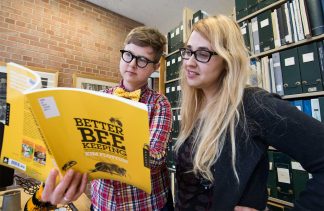By Allison Campbell-Jensen
Data seems to be everywhere, used by everyone. Data backs up assertions, demonstrates correlations, and assesses how and when policies change. Different demographic segments welcome transformations — or not. Whether one reads “Lies, Damned Lies, and Statistics” by Michael Wheeler (1976), takes an information literacy class from a librarian, or pulls out paper and pencil to try to work out what a factoid is really saying, understanding data is an important skill for every American citizen.
For the global cohort of graduate students, mastering the management of data factors even larger in terms of their future success. Whether they are a physician pursuing a master’s degree in public health, an Extension staffer learning about “web scraping,” or a researcher in the Voyageurs area, tracking wolves, each person has their own needs to tackle the issues and challenges presented by understanding how to collect, analyze, and disseminate data with integrity and good intentions.
Since 2012, University of Minnesota librarian teams have led or contributed to the foundational Data Management Bootcamp. Since moving to an online format in 2020, the instructors have helped cultivate a group of students who help teach each other, as well as being supportive of even greater numbers of grad students early in their research careers in a wider variety of academic disciplines.
On a riverboat
“I acquired knowledge of [Zotero and other data management] software that will make my academic life easier and the process of writing papers more smooth.”
—Luis L. Silva
Luis Leal Silva, a physician serving in the Brazilian navy, was not at sea during the Data Management Bootcamp in January that was organized by Librarians Wanda Marsolek and Katie Barrick. He was on the Amazon River. Contacted via email, he said the air temperature and humidity both exceeded 90% — much different than the big chill being experienced by his course instructors in Minnesota at the time.
“I am starting my MPH,” he wrote, “as I plan on expanding my horizons in the field of medicine, to focus more on populations and not so much on individual patients as we physicians tend to do.”
The Bootcamp suited his needs very well.
“I acquired knowledge of [Zotero and other data management] software that will make my academic life easier and the process of writing papers more smooth.”
That is welcome news to the librarians who helped organize and teach the course. Shannon Farrell, Natural Resources Librarian, taught the “Starting Your Journey” session for the Data Management Bootcamp and was a tech host for another session. Marsolek, Engineering Liaison and Data Curation Librarian, and Barrick, Biosciences Librarian of Magrath Library, and Scientific Data Curator for the Data Repository for University of Minnesota (DRUM), led planning for the January 2022 Data Management Bootcamp for graduate students along with teaching sessions.
The Data Management Bootcamp is successful based on years of iterated improvement and dedicated staff from the library and other research support service areas such as LATIS who volunteer considerable time to plan and teach interactive sessions with the participants. This most recent Bootcamp was a massive effort on everyone’s part. There were 260 registrants and 231 attendees, which far surpassed previous (also very successful) attendance figures. The goal of the course was described in their impact report: “The Research Data Services Team (RDS) designed the Data Management Bootcamp for early-stage graduate students conducting a major research project for the first time.”
Clued into the challenges of online teaching
“We start off with our data fails,” Farrell says. “Everyone from the Research Services Team shares a data fail.” Each leader talks about what they did wrong in a past research project — and how they tackled the mess and, usually, came out with decent results. “We try to inject humor and to warm up” the proceedings, she says, which are taught partly by video sessions and partly in live, online sessions.
It’s important to raise awareness among grad students, particularly in the humanities and social sciences, that “Data are people,” said Shalonda Martin, Senior Director of Data Integrity, DEI Council Chair, USC, at a recent data conference for higher education advancement professionals. Another goal, says Marsolek, is to promote the perspective that managing data can be interesting, stimulating, and, sometimes, even fun. They told a family member that one of their professional titles is “data curator.”
“Data curator? That sounds really boring,” the person said. Marsolek’s response was an emphatic: “Not at all!”
Bootcamp teaches skills to use now or later
Scraping the Web is a skill learned by Susan E Roedl, an evaluation program assistant in the U of M Extension. “Web-scraping,” she says, is “when you go to a website, to access its data.”
During the class, the participants went to an Animal Humane Society website. “Then we made an Excel sheet of all the dogs just by lifting [the information] right up off their website.”
The tool is free, Roedl notes, and potentially powerful for researchers. “They [the instructors] showed us Excel things. [How to figure out] what dogs are available and how to sort them by size and breed and so forth.”
Roedl enrolled in the course to improve her abilities to assist researchers and educators in their field of family development. “Right now, I am just telling people what the possibilities are,” she says.
“I feel confident we’re going to have uses for it.” Because data — and researchers’ needs to manage data — are everywhere.





